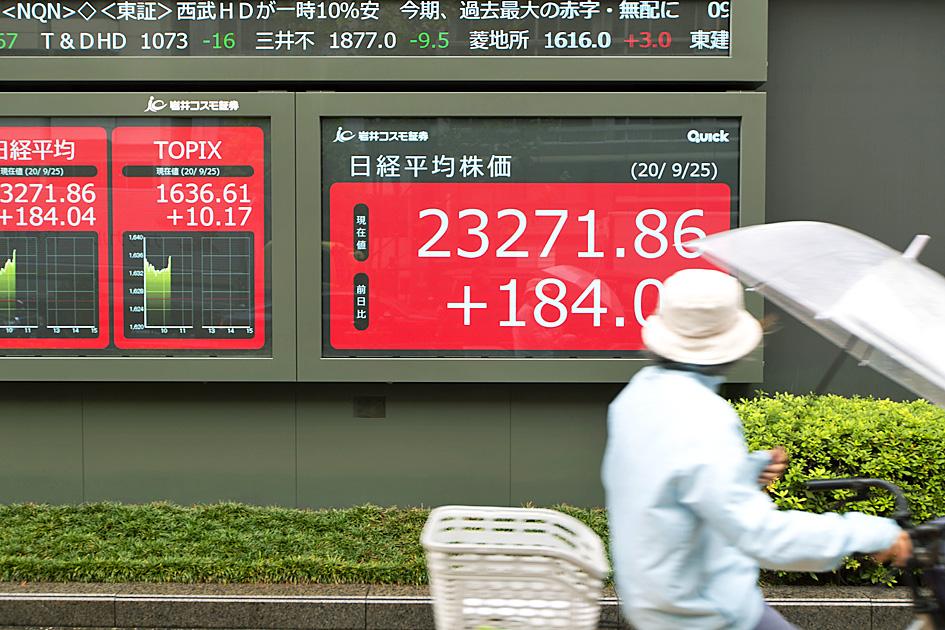Most Asian shares advanced on Friday, cheered by a modest rally on Wall Street and rising hopes for fresh stimulus for the US economy.
Despite signs of a global economic rebound in the third quarter, worries remain that the upturn might be running out of steam.
Democrats from the US House of Representatives said that they are paring back their proposal for a new stimulus package in an attempt to jump-start negotiations with the administration of US President Donald Trump.

Photo: AP
US Secretary of the Treasury Steven Mnuchin and US Federal Reserve Chairman Jerome Powell have said that the government’s top priority should be to provide affordable loans to small businesses and further support for millions of Americans still unemployed.
Paralyzing partisanship has prevented a US Congressional renewal of aid, and the recent vacancy following the death of Supreme Court justice Ruth Bader Ginsberg has deepened the divide.
The renewed optimism that the world’s biggest economy might receive another boost carried over into Friday’s trading.
“This stimulus deal needs to go through,” Stephen Innes of AxiCorp Financial Services Pty said in a commentary. “With the risks building up everywhere you look, it doesn’t seem to be a great time to be trying to pick the bottom of equity markets, but a stimulus relief bill will go a long way to nudging the market along.”
Japan’s benchmark Nikkei 225 edged up 0.51 percent to 23,204.62, dropping 0.67 percent for the week. Australia’s S&P/ASX 200 rose 1.51 percent to 5,964.90, gaining 1.71 percent for the week, while South Korea’s KOSPI added 0.27 percent to 2,278.79, but lost 5.54 percent from a week earlier.
However, in Taiwan, the TAIEX ended down 31.47 points, or 0.26 percent, at 12,232.91, after moving between 12,149.81 and 12,385.81, on turnover of NT$209.042 billion (US$7.14 billion) on Friday.
It lost 4.99 percent for the week.
Hong Kong’s Hang Seng gave up earlier gains, sinking 0.32 percent to 23,235.42, and also lost 4.99 percent from a week earlier, while the Shanghai Composite Index fell 0.12 percent to 3,219.42, and declined 3.56 for the week.
Additional reporting by staff writer, with CNA

Stephen Garrett, a 27-year-old graduate student, always thought he would study in China, but first the country’s restrictive COVID-19 policies made it nearly impossible and now he has other concerns. The cost is one deterrent, but Garrett is more worried about restrictions on academic freedom and the personal risk of being stranded in China. He is not alone. Only about 700 American students are studying at Chinese universities, down from a peak of nearly 25,000 a decade ago, while there are nearly 300,000 Chinese students at US schools. Some young Americans are discouraged from investing their time in China by what they see

MAJOR DROP: CEO Tim Cook, who is visiting Hanoi, pledged the firm was committed to Vietnam after its smartphone shipments declined 9.6% annually in the first quarter Apple Inc yesterday said it would increase spending on suppliers in Vietnam, a key production hub, as CEO Tim Cook arrived in the country for a two-day visit. The iPhone maker announced the news in a statement on its Web site, but gave no details of how much it would spend or where the money would go. Cook is expected to meet programmers, content creators and students during his visit, online newspaper VnExpress reported. The visit comes as US President Joe Biden’s administration seeks to ramp up Vietnam’s role in the global tech supply chain to reduce the US’ dependence on China. Images on

New apartments in Taiwan’s major cities are getting smaller, while old apartments are increasingly occupied by older people, many of whom live alone, government data showed. The phenomenon has to do with sharpening unaffordable property prices and an aging population, property brokers said. Apartments with one bedroom that are two years old or older have gained a noticeable presence in the nation’s six special municipalities as well as Hsinchu county and city in the past five years, Evertrust Rehouse Co (永慶房產集團) found, citing data from the government’s real-price transaction platform. In Taipei, apartments with one bedroom accounted for 19 percent of deals last

US CONSCULTANT: The US Department of Commerce’s Ursula Burns is a rarely seen US government consultant to be put forward to sit on the board, nominated as an independent director Taiwan Semiconductor Manufacturing Co (TSMC, 台積電), the world’s largest contract chipmaker, yesterday nominated 10 candidates for its new board of directors, including Ursula Burns from the US Department of Commerce. It is rare that TSMC has nominated a US government consultant to sit on its board. Burns was nominated as one of seven independent directors. She is vice chair of the department’s Advisory Council on Supply Chain Competitiveness. Burns is to stand for election at TSMC’s annual shareholders’ meeting on June 4 along with the rest of the candidates. TSMC chairman Mark Liu (劉德音) was not on the list after in December last